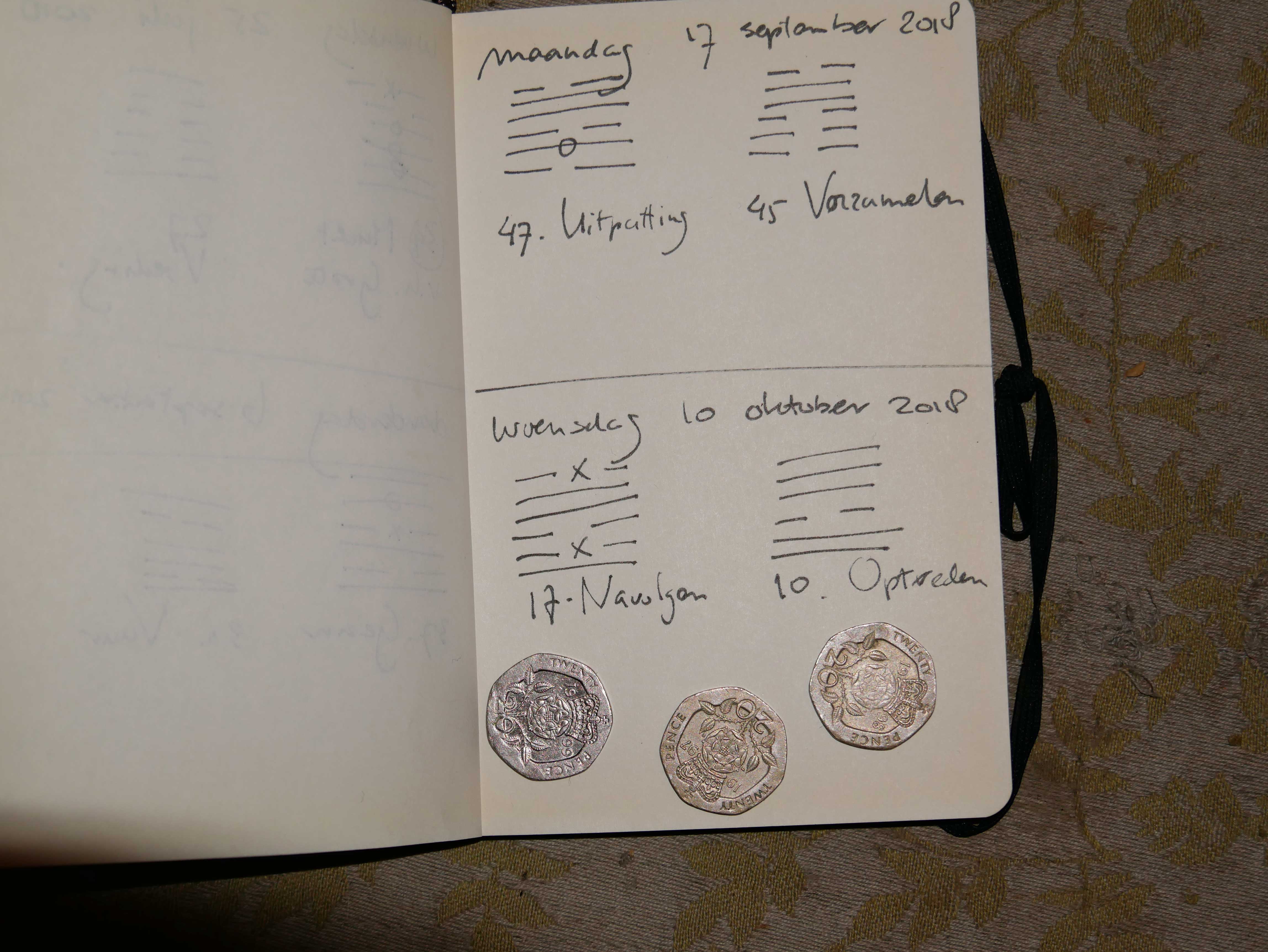
Treading
above TUI THE JOYOUS, LAKE
below CHêN THE AROUSING, THUNDERThe trigram Tui, the Joyous, whose attribute is gladness, is above; Chên, the Arousing, which has the attribute of movement, is below. Joy in movement induces following. The Joyous is the youngest daughter, while the Arousing is the eldest son. An older man defers to a young girl and shows her consideration. By this he moves her to follow him.
THE JUDGMENT
FOLLOWING has supreme success.
Perseverance furthers. No blame.In order to obtain a following one must first know how to adapt oneself. If a man would rule he must first learn to serve, for only in this way does he secure from those below him the joyous assent that is necessary if they are to follow him. If he has to obtain a following by force or cunning, by conspiracy or by creating faction, he invariably arouses resistance, which obstructs willing adherence. But even joyous movement can lead to evil consequences, hence the added stipulation, “Perseverance furthers” –that is, consistency in doing right– together with “No blame.” Just as we should not ask others to follow us unless this condition is fulfilled, so it is only under this condition that we can in turn follow others without coming to harm.
The thought of obtaining a following through adaptation to the demands of the time is a great and significant idea; this is why the appended judgment is so favorable.THE IMAGE
Thunder in the middle of the lake:
The image of FOLLOWING.
Thus the superior man at nightfall
Goes indoors for rest and recuperation.In the autumn electricity withdraws into the earth again and rests. Here it is the thunder in the middle of the lake that serves as the image–thunder in its winter rest, not thunder in motion. The idea of following in the sense of adaptation to the demands of the time grows out of this image. Thunder in the middle of the lake indicates times of darkness and rest. Similarly, a superior man, after being tirelessly active all day, allows himself rest and recuperation at night. No situation can become favorable until one is able to adapt to it and does not wear himself out with mistaken resistance.
Six in the second place means:
If one clings to the little boy,
One loses the strong man.In friendships and close relationships an individual must make a careful choice. He surrounds himself either with good or with bad company; he cannot have both at once. If he throws himself away on unworthy friends he loses connection with people of intellectual power who could further him in the good.
Six at the top means:
He meets with firm allegiance
And is still further bound.
The king introduces him
To the Western Mountain.This refers to a man, an exalted sage, who has already put the turmoil of the world behind him. But a follower appears who understands him and is not to be put off. So the sage comes back into the world and aids the other in his work. Thus there develops an eternal tie between the two.
The allegory is chosen from the annals of the Chou dynasty. The rulers of this dynasty honored men who had served them well by awarding them a place in the royal family’s temple of ancestors on the Western Mountain. In this way they were regarded as sharing in the destiny of the ruling family.
above CH’IEN THE CREATIVE, HEAVEN
below TUI THE JOYOUS, LAKEThe name of the hexagram means on the one hand the right way of conducting oneself. Heaven, the father, is above, and the lake, the youngest daughter, is below. This shows the difference between high and low, upon which composure correct social conduct, depends. On the other hand the word for the name of the hexagram, TREADING, means literally treading upon something. The small and cheerful [Tui] treads upon the large and strong [Ch’ien]. The direction of movement of the two primary trigrams is upward. The fact that the strong treads on the weak is not mentioned in the Book of Changes, because it is taken for granted. For the weak to take a stand against the strong is not dangerous here, because it happened in good humor [Tui] and without presumption, so that the strong man is not irritated but takes it all in good part.
THE JUDGMENT
TREADING. Treading upon the tail of the tiger.
It does not bite the man. Success.The situation is really difficult. That which is strongest and that which is weakest are close together. The weak follows behind the strong and worries it. The strong, however, acquiesces and does not hurt the weak, because the contact is in goof humor and harmless.
In terms of a human situation, one is handling wild, intractable people. In such a case one’s purpose will be achieved if one behaves with decorum. Pleasant manners succeed even with irritable people.THE IMAGE
Heaven above, the lake below:
The image of TREADING.
Thus the superior man discriminates between high and low,
And thereby fortifies the thinking of the people.Heaven and the lake show a difference of elevation that inheres in the natures of the two, hence no envy arises. Among mankind also there are necessarily differences of elevation; it is impossible to bring about universal equality. But it is important that differences in social rank should not be arbitrary and unjust, for if this occurs, envy and class struggle are the inevitable consequences. If, on the other hand, external differences in rank correspond with differences in inner worth, and if inner worth forms the criterion of external rank, people acquiesce and order reigns in society.